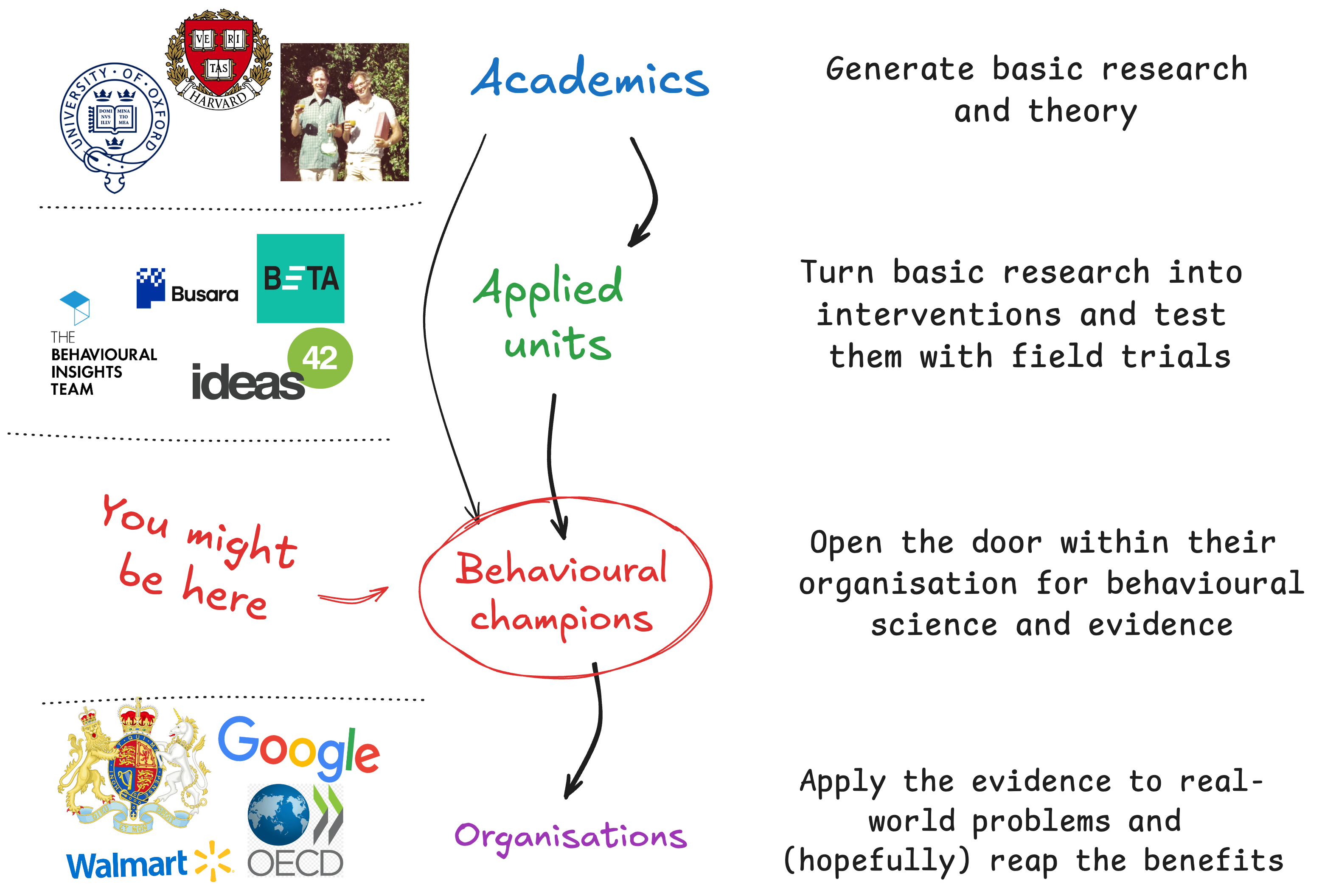
What is a Behavioural Champion?
Behavioural science is the study of how people make decisions. All of us start out as pretty fantastic intuitive behavioural scientists: for thousands of years our survival depended on interpreting and anticipating the behaviour of the people around us. Decades of careful research have now put us in a position to improve on the intuitive model somewhat. For example, what our peers are doing turns out to influence us more than we realise or admit. Decisions involving small probabilities or the far future can throw us off. And small amounts of hassle matter more than it seems like they should.
These insights are potentially very valuable for organisations grappling with human behaviour, whether that's governments trying to get people to pay their taxes on time, businesses trying to persuade potential customers to try their product, or any team trying to get the best out of its people.
So this is all we're talking about when we say 'applied behavioural science': start with a problem (some people aren't paying their taxes), take an insight from behavioural science (we are surprisingly heavily influenced by 'social norms', by what others around us are doing), apply that insight (rather than making more threats, inform late payers of the (true) fact that 9 out of 10 others have already paid), and measure what happens (payment rates increase, from 38.7% to 45.5% in one trial).
The Behavioural Science Production Function
But these insights don't get adopted automatically. A stylised picture of the behavioural science production function is as follows:

Where is the bottleneck in this picture? If we wanted to 10x the impact of behavioural science on the world, what do we need more of?
The answer is behavioural champions. An effective behavioural champion within an organisation can do the following:
- Spot situations where a behavioural science solution could help.
- Build relationships with the operational teams working in those areas.
- Give valuable ad hoc advice to colleagues - for example rewriting one-off communications, or advising on policy changes.
- Initiate and manage behavioural science projects.
- Collaborate with external academics and research units, and help them navigate the organisation.
- Persuade leadership to fund behavioural science projects.
- Persuade leadership to run experiments.
- Persuade leadership to make operational changes in response to the results of those experiments.
- Understand what 'good' looks like when designing solutions or hiring consultants.
- Be on hand in the months after changes are made to speak to the teams implementing them, check that the solutions are working as they should, make adaptations, and learn lessons to share with the rest of the organisation.
- Gradually build up a deep knowledge of how behavioural science applies in their specific field.
- Run training sessions, book clubs, and seminars with expert speakers.
- Start a community of practice with like-minded colleagues.
- Connect and swap ideas with behavioural champions in other organisations in their industry and internationally.
- Establish a dedicated internal behavioural science unit to develop nudges and run experiments at scale.
Without this work, those great ideas coming out of research labs don't get applied in the real world. They also don't get tested in the real world, which is the only true measure of any behavioural science finding. Similarly, applied behavioural units have a lot of expertise, but they can do nothing on their own. They need organisations to partner with, to supply problems to work on, and to fund that work. These relationships are almost invariably initiated, sponsored, and sustained by behavioural champions within the partner organisations.
Why become a behavioural champion?
So the behavioural science ecosystem would fall apart without behavioural champions. But perhaps becoming one sounds like a lot of work. And it is: getting a behavioural solution designed and implemented takes a lot of time and grit. Why bother?
From our conversations with champions in many different organisations over the years, a few reasons stand out:
- It's fun: Behavioural economics and behavioural science more generally are intrinsically fascinating. They are concerned with human questions that we can recognise and relate to in our own lives. They are fodder for stimulating lunchtime conversations. It's a field that lends itself to the kind of playful curiosity modelled by greats of the field such as Daniel Kahneman and Richard Thaler.
- It's empowering: Large organisations can fall prey to a version of psychologist Martin Seligman's 'learned helplessness'. Getting commonsense improvements implemented is so difficult, time-consuming, and prone to reverses that people learn not to try. Behavioural science-informed nudges can be a tonic: concrete changes yielding small but measurable improvements. They can create a momentum for new ideas and experimentation that makes for a much more exciting work environment.
- It's an investment: Many behavioural champions we speak to first came across these ideas 10 or 15 years ago. Many have since moved on to new organisations, new roles, even new industries. But they have taken the behavioural science perspective and toolkit with them. The context and challenges are different but humans, and the value of a scientific approach, stay the same. Learning and internalising a more accurate model of human behaviour is an investment with a continuous payoff.
So that's the 'what' and the 'why' of being a behavioural champion. In the remainder of this handbook we'll turn our attention to the 'how'.